Wisdom Teeth Removal – Castle Rock, WA
Create Healthier Smiles by Removing Unnecessary Teeth

It is usually considered a rite of passage when teenagers and young adults between the ages of 16 and 22 have their wisdom teeth removed. While some individuals have no problems once these third molars erupt, most cases require oral surgery to prevent worsening oral health issues later on in life. Dr. Kennington is equipped with the right technology, skill, and experience to perform this common procedure in-house, so you can remain in one convenient location while allowing our team to improve the health and future of your smile. Contact us today to find out if you or your child may need to undergo wisdom tooth extraction in Castle Rock.
What Are Wisdom Teeth?
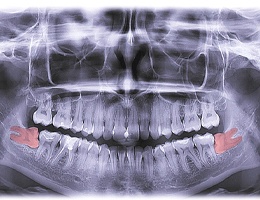
Wisdom teeth are known as third molars. Once considered a vital component of a person’s oral cavity, early civilizations used them to gnaw and eat coarse foods. As time progressed and jawbones narrowed, these teeth were no longer necessary, yet they continue to erupt. As a result, they can cause overcrowding, infection, and serious pain. Not to mention, your oral health can decline if they remain in place and continue to cause problems.
Why Do Wisdom Teeth Need to Be Removed?
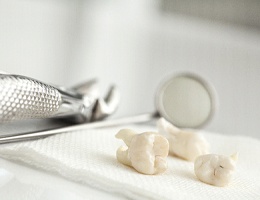
Depending on the capacity inside your oral cavity, your wisdom teeth may erupt with no problems at all. However, if you’re like most people, it’s unlikely that your teeth will erupt fully or at all, leaving them impacted beneath the gum line. As a result, you’ll need to have them removed:
- Because you’re experiencing fever, pain, and swelling as a result of an infection
- Because your bite is no longer in proper alignment
- If you begin to feel persistent pain or pressure toward the back of the mouth
What to Expect From the Wisdom Teeth Procedure
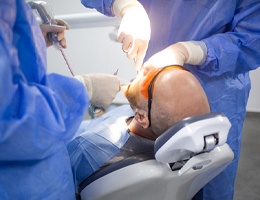
Should Dr. Kennington believe you or your child might benefit from this type of oral surgery, we will first examine your oral cavity and take digital images to identify the positioning and alignment of the teeth. Whether erupted or impacted, you will receive local anesthesia and sedation if necessary. We will then make a small incision in your gums to expose the wisdom tooth. Using the specialized dental instruments, we will remove the tooth in section (if impacted) or gently rock it back and forth until it detaches (partially erupted). This makes it possible for you to keep more of your bone.
Recovering From Wisdom Teeth Extraction
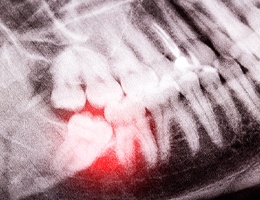
Once your wisdom teeth removal procedure is complete, your dentist in Castle Rock will provide detailed instructions as to how you can properly take care of your smile while at home.
The first step is to get plenty of rest, as you’ll need someone to escort you home after your procedure. If you need to take any antibiotics or pain medicine, you can do so, as well as apply an ice pack for 20-minute intervals. When brushing your teeth, be careful around your surgical sites, as you don’t want to irritate them.
For the first day, make sure to only consume liquids before transitioning to soft foods on the second day. As your mouth becomes less tender and more “normal,” solid foods may be incorporated slowly. You just need to be mindful in the beginning so you don’t develop a dry socket that could cause immense pain and potential infection.
Understanding the Cost of Wisdom Tooth Extractions

Wisdom tooth removal is a common procedure that is necessary for most patients. The process might look similar, but the cost will likely be vastly different. Why? Because each individual is unique, and there are varying factors that can increase or decrease the cost. If you’re ready to learn more about how much you can expect to pay for wisdom tooth extractions, keep reading.
Factors That Can Impact the Cost of Wisdom Tooth Extractions
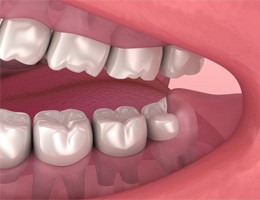
During your initial consultation with Dr. Kennington, he will examine your mouth using diagnostic images. After completing a visual evaluation of your third molars, he will consider the following factors when determining the overall cost:
- How many teeth need to be removed? Maybe you only need one or all four. The reality is that the more you need to have extracted, the more you can expect to pay.
- Are your teeth impacted or have they partially erupted? This will determine the type of extraction you will need: simple or surgical.
- Do you require sedation? If you need a form of sedation dentistry apart from the local anesthesia you will receive, you can expect it to be added to the overall price tag for treatment.
- Are you seeing a specialist? If you were to see an oral surgeon for this type of procedure, you could expect to pay much more for treatment because of their advanced training and experience.
Does Dental Insurance Cover Wisdom Tooth Extractions?

There is a good chance that your dental insurance will cover part of your wisdom tooth extraction. Because it is considered a medical necessity that can improve the state of your oral and overall health, you may receive anywhere from 50-80% coverage from your dental insurance company. However, this is if you choose to see an in-network dentist. You can opt to see someone who is out of network, but you will need to pay more for this type of procedure. No matter what, you can expect our team to help you better understand the facts of your policy and how you can get the most out of your plan.
Other Options for Making Wisdom Tooth Extractions Affordable

At Cowlitz River Dental, Dr. Kennington never wants patients to forgo treatment because they believe they cannot afford it. When it comes to wisdom tooth extraction, we are pleased to offer flexible financing through CareCredit. This third-party company offers low-interest and no-interest plans to make paying for treatment easy and less stressful. With no surprise fees, you can rest easier knowing that your smile will improve without having to empty your wallet.
Wisdom Tooth Extractions FAQs

Realizing that you need to have your wisdom teeth removed and accepting the reality that you’re about to undergo the process of having them extracted can stir a lot of emotions. While some individuals just want them out so that the discomfort will cease, others are more fearful of what to expect. Dr. Kennington understands that when it comes to a procedure like this, there are often many questions. In the past, we’ve received countless inquiries from those who want to learn more about the need for extraction and what it entails. This is why we have a list of frequently asked questions you can review below.
Does everyone have wisdom teeth?
According to a study published in the Dental Research Journal In 2015, 5-37% of people have one or more missing wisdom teeth. While most have all four of their third molars, some never develop them, and there’s not much to point to for the reason. It may be that genetics is the cause, but even if you can’t see your wisdom teeth, it doesn’t mean they’re not there. The only way to determine if you have one or all four is to have a dental X-ray completed by your dentist.
Is wisdom tooth removal painful?
No, wisdom tooth removal is not painful, and the reason is that Dr. Kennington will administer local anesthesia before beginning the extraction process. This will numb the tooth or teeth and the area around it. You will feel no pain throughout the procedure; however, you might feel some slight pressure. There is also the possibility that you will receive sedation, so you’ll remain completely comfortable.
After the procedure is complete and the anesthesia wears off, you can expect to feel some soreness and minor discomfort; however, this can be remedied with an OTC pain reliever and a cold compress. This should only be temporary.
Should wisdom teeth be removed before braces?
Your dentist will evaluate your smile to determine if you need to have your wisdom teeth removed before starting the process of wearing braces. Because these third molars can press against nearby healthy teeth, they may destroy or prolong your time in braces if you do not have them removed beforehand.
Even while wearing a retainer each night, your wisdom teeth can place pressure on other teeth and move them out of alignment, effectively undoing all of your orthodontic work. By removing these teeth before you begin orthodontics, you are provided with a smile that can easily be moved and shifted, ensuring that your braces will lead to better results.
Teenagers who have already undergone orthodontics before their third molars erupt should plan to seek treatment as soon as they are evident to avoid destroying the work of their braces. If braces are being worn while these teeth erupt, it can pose a serious problem, making it difficult if not impossible for teeth to shift in the right direction. Too much pressure can cause your healthy teeth to crack or break, resulting in root canals, dental crowns, and additional extractions.
When can I use a straw after wisdom teeth removal?
You do not want to immediately begin using a straw after wisdom teeth removal because of the blood clot that must remain in the socket to ensure proper healing. Sucking through a straw can cause it to dislodge, resulting in a dry socket that can be painful and increase your chances of infection.
You should wait to use a straw until day two or three, but your dentist will consider several factors such as your age, medical history, rate of healing, and more before giving you a definitive time.
Do wisdom teeth stitches dissolve?
The wisdom teeth removal process does require stitches because they help to stabilize the tissues surrounding the incisions. Designed to dissolve on their own, it can take several weeks or even one month before they no longer exist. This will vary based on the severity of your extraction and the type and material of the stitch your dentist uses.
If stitches need to be removed and do not dissolve, you’ll need to return to have them taken out approximately 7-10 days after your procedure.
